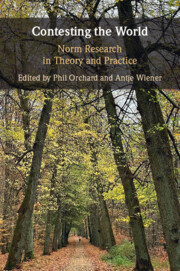Book contents
- Contesting the World
- Contesting the World
- Copyright page
- Contents
- Figures
- Tables
- Contributors
- Acknowledgements
- Abbreviations
- 1 Introduction
- Part I Norm Strength, Collisions, and Conflicts
- Part II Development of the Field
- Part III Meta-theorising, Linkages, and International Law
- Part IV Dimensions of Norm Contestation
- 12 Of Norms and Networks
- 13 Regulatory Contestation and the Creation of Transnational Legal Orders
- 14 Norms, Normativity, and Pragmatist Justification
- 15 Social in Practice, Contested in Principle
- References
- Index
14 - Norms, Normativity, and Pragmatist Justification
Advancing the Third Move in Norm Research
from Part IV - Dimensions of Norm Contestation
Published online by Cambridge University Press: 01 November 2024
- Contesting the World
- Contesting the World
- Copyright page
- Contents
- Figures
- Tables
- Contributors
- Acknowledgements
- Abbreviations
- 1 Introduction
- Part I Norm Strength, Collisions, and Conflicts
- Part II Development of the Field
- Part III Meta-theorising, Linkages, and International Law
- Part IV Dimensions of Norm Contestation
- 12 Of Norms and Networks
- 13 Regulatory Contestation and the Creation of Transnational Legal Orders
- 14 Norms, Normativity, and Pragmatist Justification
- 15 Social in Practice, Contested in Principle
- References
- Index
Summary
My aim in this chapter is to contribute to what the volume calls the ‘third move’ in International Relations norm studies, which explicitly addresses the legitimacy of the norm being studied as well as its influence on practice. I build on the work of those who point to the relevance of classical American Pragmatism, which considers how we know that what we are doing is appropriate once we realise that norms are the product of social and historical practices rather than abstract moral foundations. I trace the Pragmatist’s commitment to deliberative inquiry through the ideas of Charles Peirce and John Dewey and relate it to Antje Wiener’s arguments that normativity is sustained through proactive contestation. While there are overlaps between the two approaches, I argue that Deweyan Pragmatism can help us understand when it is appropriate to defend a norm against contestation. It does this by drawing on what Dewey called a ‘stock of learning’, understood as the background knowledge that has epistemic authority because it is the product of a deliberative and inclusive process of inquiry. I develop this with reference to debates within Pragmatist philosophy before applying it to offer a preliminary assessment of global health norms.
- Type
- Chapter
- Information
- Contesting the WorldNorm Research in Theory and Practice, pp. 236 - 251Publisher: Cambridge University PressPrint publication year: 2024

